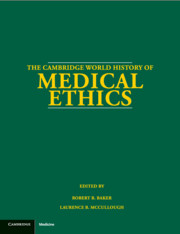Book contents
- Frontmatter
- PART I AN INTRODUCTION TO THE HISTORY OF MEDICAL ETHICS
- 1 What is the History of Medical Ethics?
- 2 Bioethics and History
- PART II A CHRONOLOGY OF MEDICAL ETHICS
- PART III DISCOURSES OF MEDICAL ETHICS THROUGH THE LIFE CYCLE
- PART IV THE DISCOURSES OF RELIGION ON MEDICAL ETHICS
- PART V THE DISCOURSES OF PHILOSOPHY ON MEDICAL ETHICS
- PART VI THE DISCOURSES OF PRACTITIONERS ON MEDICAL ETHICS
- PART VII THE DISCOURSES OF BIOETHICS
- PART VIII DISCOURSES ON MEDICAL ETHICS AND SOCIETY
- Appendix: Biographies: Who Was Who in the History of Medical Ethics
- Bibliography
- Index
2 - Bioethics and History
from PART I - AN INTRODUCTION TO THE HISTORY OF MEDICAL ETHICS
Published online by Cambridge University Press: 28 May 2012
- Frontmatter
- PART I AN INTRODUCTION TO THE HISTORY OF MEDICAL ETHICS
- 1 What is the History of Medical Ethics?
- 2 Bioethics and History
- PART II A CHRONOLOGY OF MEDICAL ETHICS
- PART III DISCOURSES OF MEDICAL ETHICS THROUGH THE LIFE CYCLE
- PART IV THE DISCOURSES OF RELIGION ON MEDICAL ETHICS
- PART V THE DISCOURSES OF PHILOSOPHY ON MEDICAL ETHICS
- PART VI THE DISCOURSES OF PRACTITIONERS ON MEDICAL ETHICS
- PART VII THE DISCOURSES OF BIOETHICS
- PART VIII DISCOURSES ON MEDICAL ETHICS AND SOCIETY
- Appendix: Biographies: Who Was Who in the History of Medical Ethics
- Bibliography
- Index
Summary
INTRODUCTION
Medical historians helped create the field that became bioethics, and medical ethicists contributed to medical history, even before the word bioethics existed (Jonsen 1993; Jonsen 1998; see also Chapter 38). Both bioethics and the social and cultural history of medicine developed as academic fields at roughly the same time and for similar reasons. Each professed a break with pre-1960s doctor-dominated approaches to their subjects, yet each also drew crucial support from reformers within medicine (Burnham 1999). Despite their similarities, however, the vast potential for interdisciplinary interchange has not been achieved.
This chapter sketches one historian's view of the relationship between medical history and bioethics. It does not survey all that has been done but rather emphasizes unrealized potentials. Disciplinary differences and misunderstandings are mapped as necessary, but the goal is to find new opportunities for cooperation, not to berate those who “got it wrong.”
WHAT HISTORY CAN DO FOR BIOETHICS
Perhaps the greatest potential contribution of history to bioethics is that studying the past can help to reveal otherwise unnoticed value issues at stake in the nondramatic daily events of modern health care. Ethical and other value issues pervade all aspects of medicine.
- Type
- Chapter
- Information
- The Cambridge World History of Medical Ethics , pp. 16 - 20Publisher: Cambridge University PressPrint publication year: 2008



